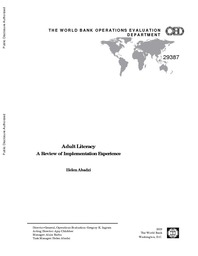| dc.contributor.author | Abadzi, Helen | |
| dc.date.accessioned | 2014-07-03T19:20:24Z | |
| dc.date.available | 2014-07-03T19:20:24Z | |
| dc.date.issued | 2003 | |
| dc.identifier.uri | http://hdl.handle.net/10106/24333 | |
| dc.description.abstract | Worldwide, nearly a billion adults, at least 600 million of them women, are illiterate. Adult literacy is highly relevant to poverty alleviation efforts worldwide, because in the 21st century much of the information needed to make decisions and improve one's economic, personal, family, or political conditions is presented in written form. The Education for All goals include " achieving a 50 percent improvement in levels of adult literacy by 2015, especially for women, and equitable access to basic and continuing education for all adults." Adult literacy is also essential in fulfilling the Millennium Development Goals. This OED study assesses the extent to which adult literacy projects financed by the World Bank help towards achieving this goal. | en_US |
| dc.language.iso | en_US | en_US |
| dc.publisher | World Bank, Operations Evaluation Department | en_US |
| dc.relation.ispartofseries | Operations Evaluation Department (OED) working paper series. Report number 29387. | en_US |
| dc.subject | Adult basic education | en_US |
| dc.subject | Adult illiteracy | en_US |
| dc.subject | Adult education | en_US |
| dc.subject | Adult literacy | en_US |
| dc.title | Adult Literacy: A Review of Implementation Experience | en_US |
| dc.type | Working Paper | en_US |
| dc.publisher.department | Department of Curriculum and Instruction, The University of Texas at Arlington | en_US |
| dc.identifier.externalLink | http://documents.worldbank.org/curated/en/2003/09/4443917/adult-literacy-review-implementation-experience | |
| dc.identifier.externalLinkDescription | The original publication is available at the World Bank Documents and Reports repository. | en_US |

